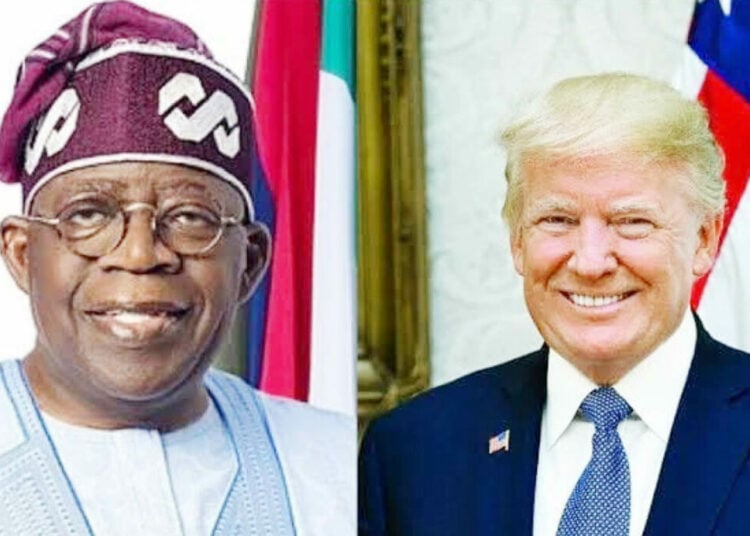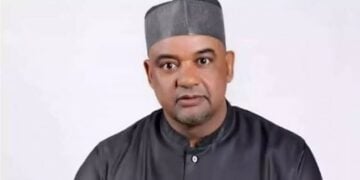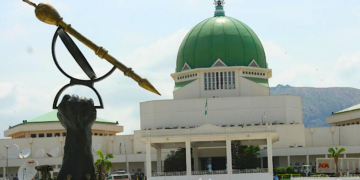The federal government has stated that diplomatic channels have been opened with the United States regarding Washington’s recent designation of Nigeria as a “country of particular concern” for religious suppression.
Minister of Information and National Orientation, Mohammed Idris, disclosed this on Thursday during a briefing to State House correspondents after the Federal Executive Council (FEC) meeting presided over by President Bola Tinubu at the Presidential Villa, Abuja.
Idris stated that the issue was discussed during the FEC deliberations and assured that the necessary actions were being taken to resolve the matter while maintaining Nigeria’s dignity and stability.
“The Nigerian government is responding to the genuine concerns raised. The politics of it aside, we genuinely are taking the issues seriously,” he said.
The minister emphasised that the Tinubu administration was not in a state of panic and was addressing security and religious freedom concerns responsibly.
“Let me say that the government of Nigeria is really very stable. The president is calm, and the members of the Federal Executive Council are indeed very calm. Are there security issues in this country? Yes. Are people being killed in parts of this country? Yes. But is the government doing anything to check that? Yes, indeed,” Idris said.
The minister added that the administration was engaging the US and other international partners diplomatically, stressing that terrorism and violent extremism are global problems that require cooperation beyond borders.
“We have porous borders, and that is why we have cooperation with our regional partners and international partners, including the United States. Channels have been opened. We prefer that this situation be solved diplomatically,” Idris stated.
The minister reaffirmed that Nigeria remains a country of religious tolerance, where every citizen has the constitutional right to worship freely without hindrance.
“The killing of even one Nigerian citizen is of concern to the government of Nigeria. Our constitution guarantees the right of every individual to practice their religion without hindrance. The government of Nigeria is committed to that and will continue to do so.
There is no panic mode here. We are responding responsibly, steadily, and in the interest of our country,” he said.
Bullet, Bombs Know Neither Ethnicity nor Religion — Shettima
For his part, Vice President Kashim Shettima warned that if bombs are dropped in Nigeria, they would affect those in the vicinity, no matter their religion.
The vice president, represented by the Deputy Chief of Staff to the President, Sen. Ibrahim Hadejia, spoke at a high-level stakeholders’ engagement on regional development organised by the National Counter Terrorism Centre, Office of the National Security Adviser (NCTC-ONSA) in Abuja.
According to him, a bullet or bomb has neither ethnicity nor religion, hence the need to collectively address the complex security challenges bedevilling the nation.
He said Nigeria cannot claim progress unless each part of the country advances simultaneously.
Shettima further stated that the current administration inherited a security challenge that compelled it to think both critically and collectively, not only about reversing the havoc it had wrought, but also about sustaining peace and stability thereafter.
He said, “Every person or organisation in the business of governance must play a role in this grand mission of national restoration.
A bullet or a bomb has neither ethnicity nor religion. When the enemies of our collective peace fire it, it does not discriminate. It kills the farmer and the trader alike, and it destroys the very fabric of our multifaceted, multi-religious, and multi-ethnic society in a devastating and retrogressive manner.
Our challenge, therefore, is not only to fight the forces behind these conflicts, but also to dismantle the sentiments that are weaponised to divide us and weaken our resolve to fight back as one nation.
Beyond ideas and agendas, we must pay close attention to the power of messaging. Our messaging must be rooted in empathy and understanding.”
He emphasised the need to build and strengthen institutions, as well as correct identified imbalances.
History Will Be Kind If You Stop Bloodshed, Christian Council Tells Tinubu
On its part, the Christian Council of Nigeria (CCN) has urged President Bola Ahmed Tinubu to seize the moment and end the wave of killings, kidnappings, and religious violence ravaging parts of the country, saying history will remember him kindly if he acts decisively to stop the bloodshed.
In a statement jointly signed by its president, Most Rev. Dr. David Onuoha, and general secretary, Rt. Rev. Dr. Evans Onyemara, the Council described the recent designation of Nigeria by the United States as a Country of Particular Concern (CPC) over alleged human rights violations and reports of Christian genocide as “a wake-up call to confront the nation’s security crisis with sincerity and courage.”
The Christian body said the U.S. government’s move should not be seen as an invasion of Nigeria’s sovereignty but rather as an opportunity to receive international assistance in tackling insurgency and violent extremism that have devastated the country for nearly two decades.
We’ll Crush Terrorism, Deepen Global Partnerships — Tinubu
President Bola Tinubu has reaffirmed his administration’s determination to end terrorism and strengthen Nigeria’s global partnerships, assuring that the nation will overcome its current security challenges through unity, diplomacy, and resilience.
Speaking during Thursday’s Federal Executive Council (FEC) meeting held at the State House, Abuja, the president stated that his government remains steadfast in engaging the international community to bolster national security and economic growth, despite facing political and global headwinds.
“The most important thing is the fact that, despite the political headwinds and the fear of our people, we will continue to engage with our partners,” Tinubu told the Council.
“The success of the $2.3 billion bond, which was oversubscribed, is very significant at this stage. We are engaging the world diplomatically, and I assure you all that we will defeat terrorism in our country.”
President Tinubu described the challenges ahead as immense but emphasised his administration’s resolve to move forward with “clarity, unity, and purpose,” guided by the Renewed Hope Agenda to build a prosperous, inclusive, and resilient Nigeria.
The president’s remarks came amid escalating tensions following threats issued by U.S. President Donald Trump, who has doubled down on his warning of possible military action in Nigeria over alleged targeted killings of Christians in the country.
On October 31, Trump redesignated Nigeria as a “country of particular concern,” citing claims of a Christian genocide in parts of the nation. He had warned the Nigerian government to “act fast” to end the killings and bring perpetrators to justice.
In a video message released on Wednesday from behind a lectern bearing the seal of his office, Trump condemned the attacks attributed to radical Islamist groups and said he was “not ruling out air strikes or boots on the ground” to “completely wipe out the Islamic terrorists killing Christians in Nigeria.”
The U.S. president further warned that Washington would suspend all aid to Nigeria if the violence continued, adding that “there would be hell to pay.
The president of the Nigerian Political Scientists Association (NPSA), Prof Hassan Saliu, has described President Bola Tinubu’s declaration to hold talks with the US over President Donald Trump’s threat to attack Nigeria as a welcome development.
Saliu said that countries relate with one another, and when there are disagreements or conflicts, they always advise resorting to diplomatic channels, which modernity has greatly impacted.
“To that extent, I welcome the President’s declaration to toe the line of diplomacy. Does Nigeria have any choice but to engage the USA? Placed side by side with America in terms of power, it is obvious that Nigeria would be nowhere to be found. The country should be somewhere up there, but unfortunately, it is not yet there,” he said.
Also commenting, the vice chancellor of the African School of Economics (The Pan-African University of Excellence), Abuja, Prof. Mahfouz Adedimeji, said the engagement of President Tinubu should be to educate President Trump about the situation in Nigeria.
He added: “I think the US President is an attention seeker, a bull in a china shop. President Tinubu should let him know that Nigeria is a sovereign country that shouldn’t be threatened.
For her part, a former female presidential candidate, Prof. Funmilayo Adesanya-Davies, lauded President Tinubu’s timely decision to initiate diplomatic talks with the United States government.
Adesanya-Davies described the move as “a wise, mature, and peace-driven decision”, emphasising that dialogue remains the most effective instrument in global diplomacy.
A senior lecturer at the University of Abuja, Dr Segun Sadraq, said Tinubu’s decision to open talks with the United States following Donald Trump’s threat of military action against Nigeria marks a defining moment in the nation’s foreign relations.
“Trump had alleged mass killings of Christians in Nigeria, vowing that the U.S. would “intervene militarily” if such continued, a claim widely condemned as misleading and diplomatically reckless,” he said.
Former US Africa Chief Warns Against Unilateral Military Moves In Nigeria
The inaugural commander of the United States Africa Command (AFRICOM), Army Gen. William Kip Ward, has cautioned against unilateral military intervention in Nigeria, stressing that any such move must be conducted in accordance with international law and in cooperation with the Nigerian government.
General Ward, who spoke when he appeared on Arise News on Thursday via Zoom, emphasised that while governments have a responsibility to protect their citizens, foreign military actions must be approached with great care.
“I’m here in the eastern United States as a pure civilian these days, not involved in any of these government activities. Our military continues to perform professionally. Soldiers, sailors, airmen, Marines, Coast Guardsmen, as well as our Guardians, do the things that are legitimate and legal when ordered by civilian authority.”
When asked whether he supported the idea of the US carrying out military attacks in Nigeria to wipe out Islamist terrorists, as former President Donald Trump reportedly proposed, Ward avoided direct endorsement.
“I’m not prepared to discuss that at all. My concern is that the people of Nigeria have the absolute right to believe their government and security forces are protecting them. That is important for all citizens wherever they may be.”
Asked further about President Trump’s remarks suggesting possible airstrikes or boots on the ground in Nigeria, Ward said he could not speculate on the former president’s intent.
“I don’t know what the President had in mind when he made those comments or what the actual plan was,” he said. “Governments have a responsibility to protect their citizens, which is one of their primary duties, and that applies not only to Nigeria but anywhere in the world.”
Ward further confirmed that, as a geographic command, AFRICOM would indeed oversee US military operations on the African continent if ordered.
“The expectation would be, as with any geographic command, that AFRICOM would be the responsible command to oversee military activities conducted on the continent of Africa and the Indian Ocean island nations,” he said.
“That’s the case with all of our combatant commands globally: European Command, Central Command, Pacific Command; each is responsible for its region.”
The general also dismissed claims that AFRICOM is logistically unprepared for such operations, following reports that the US no longer has drone bases in West Africa or a carrier strike group near the Gulf of Guinea.
“No combatant command has permanently assigned forces. When an operation is undertaken, the resources required are directed and prioritised to accomplish the assigned mission.
“That is not unusual. The United States has always had the global capability to deploy forces wherever they may be required.”
He emphasised that any operation, particularly one involving a partner nation like Nigeria, must be thoroughly assessed for risks, resources, and collaboration requirements.
“Operations that are conducted or planned must take into account risk, the resources necessary, the amount of information needed to understand the environment, and the assistance of partners and other entities that share common interests.
“Those risks are understood, and steps are taken to mitigate them as much as possible,” he added.





